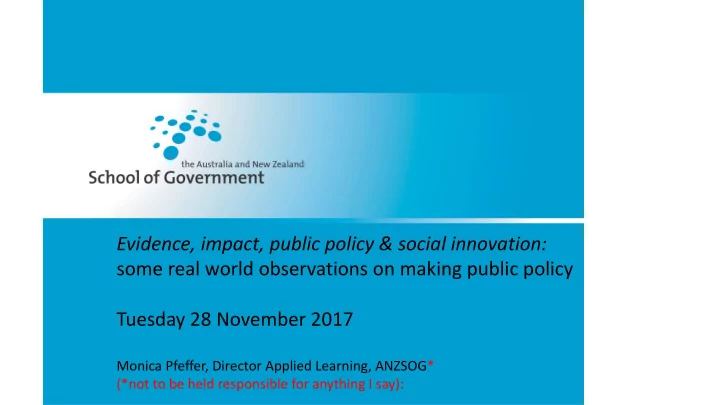

Evidence, impact, public policy & social innovation: some real world observations on making public policy Tuesday 28 November 2017 Monica Pfeffer, Director Applied Learning, ANZSOG* (*not to be held responsible for anything I say):
So what’s my claim to know something about evidence & public policy? Fair question! 27 years in the VPS, involved with (inter alia) income security and State concessions, women’s policy and family violence, social justice, ageing, disability, COAG health reform, health inequalities, diversity, poverty and social (in)exclusion, Indigenous Affairs, A Fairer Victoria and youth justice. Came into government from the Politics Department at Monash, determined to achieve some worthwhile change in the real world Learned quite a lot along the way, all important but not necessarily all good news J
Oh if only y this was how it worked…
Because in practice, it’s much more like this…
Not cynical, just realistic….In the real world, Ministers want ideas which: Kill as many birds as possible with the same stone (policy resonance or multiple problem solution) Make stakeholders happy Gather widespread community support (eg kindergartens, as opposed to HIV-AIDS) Save money, now or in the medium to long term Make them feel and look good – there are no unsung heroes in politics! Are guaranteed to deliver benefits, preferably with very few risks
Ma Many of the contemporary trends are not helping evidence ce-bas based d po polic licy • Populism and the revolt against elites, experts and science • 24/7 media, the permanent campaign and cruelly short electoral cycles • Loss of trust in institutions and in government • The multiplication of wicked problems • And paradoxically, some new ideas – like networked governance and co-design
Th There’s no point bemo moaning this reality • Lots of human nature going round Rule #1 for all of us in the policy game: Go with the motivation you’ve got in the room. Use whatever evidence (or even anecdote) will work Jurisdictions have competitive instincts • Rule #2: Use this to argue for worthwhile policy transfer (APO, you are SO useful for this J ) Scholars, you could be more helpful than at present • Rule #3: If you’re asked for, say, 3 ideas to address a problem, DON’T ask for more data and more research funds for your institution– show moral courage, recommend real action right here and now Not for profits, ditto • Rule #4: We can’t have long term, non partisan, joined up strategies for everything Fellow bureaucrats • Rule #5: We must never think we’re better than the democracy we serve Don’t make your decision maker feel stupid, even if you’re having a Rex Tillerson moment Our politicians have language, seasons and timing of their own – learn this stuff, use it for good
Recommend
More recommend